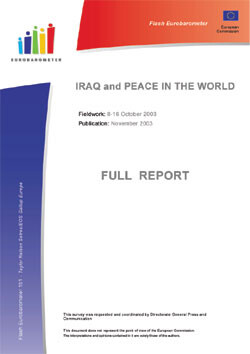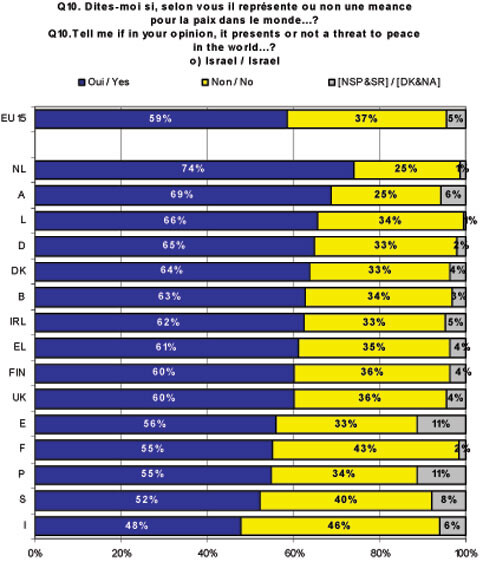The Electronic Intifada 3 November 2003

The European Commission survey asked the public in all 15 member states to look at a list of countries and say which they considered potential threats to peace. Israel was selected by a majority in almost all the EU member states, with 74% of Dutch citizens putting the country at the top of the list as a threat to peace and 69% of Austrian citizens. Italy is the only country where opinions are divided with 48% of respondents confirming that they perceive Israel as a threat to peace in the world and 46% of the opposite opinion.
In all member states, with the exception of Italy, the majority of citizens believe Israel presents a threat to peace in the world with “yes” results in the EU as a whole as 59%. Iran, North Korea and America were all selected by 53% as a threat. The survey also listed Iraq, Afghanistan, Saudi Arabia, Lybia, Pakistan, China and Russia as potential threats. The survey even includes the EU - and in Britain 18% felt the 15-nation bloc posed a threat.

“Iraq and Peace in the World” - EOS Gallup Europe, October 2003
Taking a look at the results, the one socio-demographic characteristic that stands out is education — the more highly educated respondents (66%) are more likely to perceive Israel as a threat to world peace than those who ceased their studies at an earlier stage (16-20: 59% and 15 and younger: 50%).
The results appear to be a mark of the widespread disapproval in Europe of the widespread violations of human rights employed by the government of Ariel Sharon.
It seems that Europeans are aware of Israeli violations of international treaties including bilateral agreements between the EU and Israel. It’s widely known in Europe that fruits and vegetables produced in the illegal settlements in the Occupied Palestinian Territories are exported and marketed to Europe as ‘Made in Israel’. This is a violation of the trade agreement between Israel and the European Union. The agreement exempts Israeli products - but not settlement products – from import duty. Settlement products include goods such as cherry tomatoes, avocados, fresh herbs, bell peppers, wine and flowers. The products are grown on land and irrigated with water confiscated from Palestinians. According to international humanitarian law, settlements are illegal. They are one of the most serious obstacles to peace and security.
Israeli Ministers and spokesmen have been at pains recently to insist that a definition of modern ‘anti-semitism’ should include criticism of the way the state of Israel treats Palestinian civilians, defining that criticism as an overt attack on Israel.
Meanwhile, the Simon Wiesenthal Centre demands that the EU be excluded from the Israel-Palestinian peace process and accusing Europe of suffering the worst outbreak of ‘anti-semitism’ since WWII.
“This poll is an indication that Europeans have bought in, “hook, line and sinker”, to the vilification and demonisation campaign directed against the state of Israel and her supporters by European leaders and media,” said Rabbi Marvin Hier, the Wiesenthal Centre’s founder.
Israeli spokesmen asked why the Palestinian Authority was not included on the list of countries that could be considered to pose a threat to world peace. A representative of EOS Gallup Europe replied: “Because the Palestinian Authority is not a country.”
The reconstruction of Iraq was the main subject matter of this Flash Eurobarometer. Around 68% of EU citizens believe that military intervention in Iraq was not justified, of which 41% take a strong stance, believing that military intervention was “not justified at all.” The survey also looked at international relations in the aftermath of the Iraqi war, the EU as an international player and the role of the EU in the Mideast peace process. Additionally, the poll looked at peace and the threat of terrorism.
The survey questioned 7,515 citizens between the 8th and 16th of October 2003. It has a margin of error of four percentage points.
To download the full report (PDF) click here.



